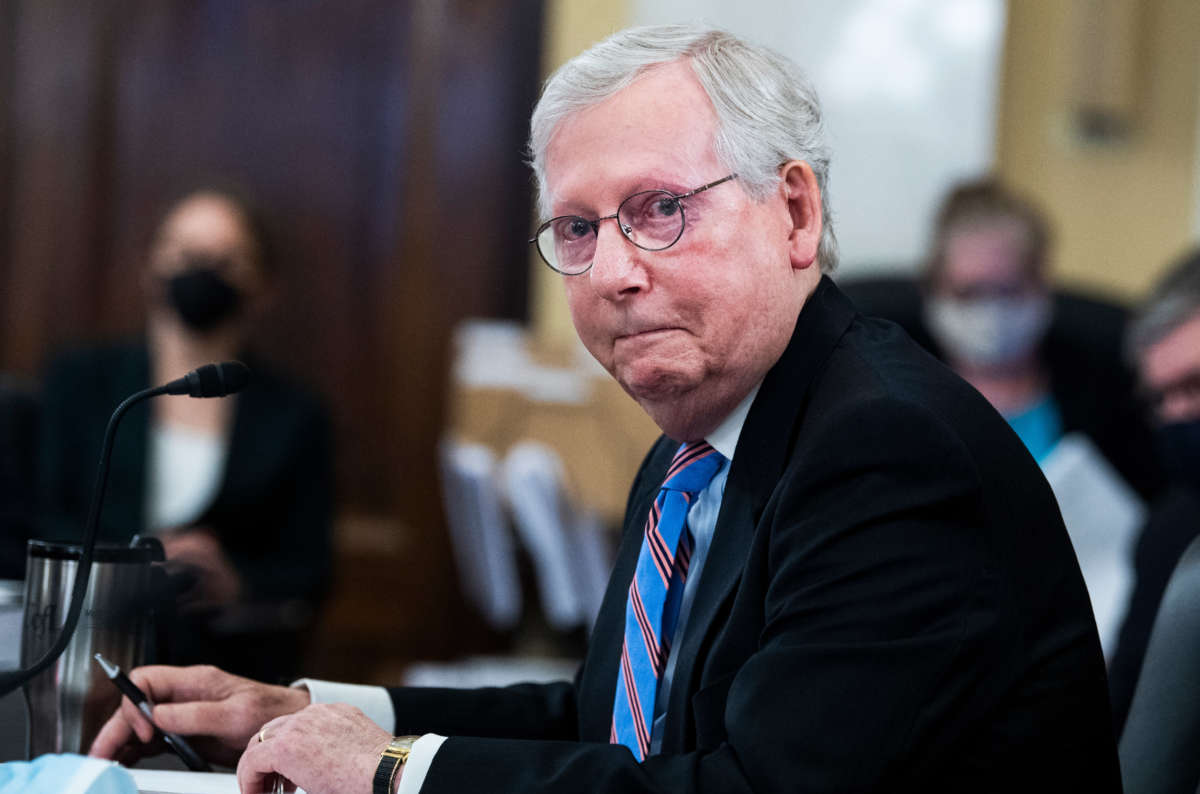Part of the Series
Voting Wrongs
One Nation PAC, an organization with ties to Senate Minority Leader Mitch McConnell (R-Kentucky), is set to run a series of television and radio ads over the next 10 days against the For the People Act, a bill in Congress that seeks to protect voting rights and make casting a ballot easier for millions of Americans.
The group, whose president and CEO is Steven Law, an individual who once served as chief of staff to McConnell, is set to spend a seven-figure dollar amount in a number of states with vulnerable or centrist Democratic senators, in hopes of influencing voters there to convince those lawmakers to vote against the bill. The legislation, which has already passed the House, is currently being discussed in a markup session within the Senate Rules Committee.
“We think this week’s markup in the Senate Rules Committee will be an important inflection point in senators’ understanding of the issue, in public awareness of” the bill, Law said to Politico. This advocacy blitz, which starts on Tuesday, is designed to amplify all points of dissent or contention among senators.
Ads are set to run in Montana, West Virginia, Arizona, New Hampshire and Nevada — states in which Republicans are either set to challenge Democrats in 2022, or where centrist senators may be more responsive to constituents’ concerns that are based on false or misleading information about the bill.
The ads do indeed contain deliberately misleading information. One ad, for example, claims that the bill would “enshrine ballot harvesting” because it would allow third party groups or individuals to collect ballots, purportedly making voting more open to fraud.
The practice of collecting another person’s ballot is not as nefarious as the ad campaign makes it out to be because it is already allowed (with a voter’s permission) in 26 states across the country, while another 10 states allow family members to turn in ballots on someone’s behalf.
Law has said that One Nation PAC plans to run the ads over the next week or so, with more ads planned for the future.
“This won’t be our last engagement on this issue,” he said. “I think this is really the beginning of a long march, not a single skirmish on the legislation.”
Law probably has more than just his political beliefs driving his opposition to the legislation — the bill would also affect how his PAC would receive political donations, as the For the People Act seeks to limit the influence of dark money in politics by requiring public disclosures for third party organizations.
In the 2020 elections alone, One Nation PAC spent around $75 million without disclosing where any of that money had come from.
Beyond providing a little sunshine on dark money spending, the For the People Act seeks to make it easier for people to register to vote and to cast ballots. It also calls for congressional maps, drawn every 10 years by state legislatures, to instead be crafted by nonpartisan agencies established by states to ensure the maps are fairly drawn.
The bill is viewed by several voting rights groups as necessary to stop voter suppression efforts happening right now in a number of Republican-controlled states across the country.
“These laws affect voters of color, young voters, poor voters,” the Brennan Center’s Michael Waldman said. “Their intent is often unambiguous. One of the sponsors of these bills in Arizona said the purpose was to make sure that only ‘quality’ voters could vote — not that everyone would have the right to vote. That does not strike me as true to our American spirit.”
Waldman added that the bill would stop the GOP effort at voter suppression “in its tracks.”
The bill, beyond being a positive force for protecting the right to vote, is also widely popular, with majorities among both Democratic and Republican voters backing its provisions when presented in a way without partisan labeling (i.e. leaving out information about which party supports it and which opposes it).
A recent Vox/Data for Progress poll asked respondents the following question:
The For the People Act is a voting reform bill that would make it easier to vote, limit the influence of money in politics, and require congressional districts to be drawn by a non-partisan commission so that no one party has an advantage. Do you support or oppose the For the People Act?
When asked in that way, 69 percent of respondents said they backed the bill — with 85 percent of Democrats, 70 percent of independents, and 52 percent of Republicans voicing support for the bill and its provisions.
A majority of independents and Democrats backed most of the reforms included in the bill on an individual basis, too. But Republicans also showed surprising support (given how staunchly opposed GOP lawmakers have been to the legislation) for a number of issues.
GOP-leaning respondents in the poll were split on the issue of automatic voter registration, with 44 percent in favor of that provision and 46 percent opposed. On the issue of same-day voter registration, a plurality (49 percent) said they backed the idea. A majority, 56 percent of Republican voters, said they supported a guarantee of 15 days of early voting, and an overwhelming 80 percent of Republican respondents said they supported provisions that would limit the influence of money in politics.
